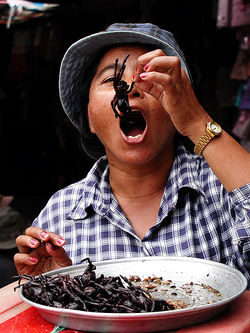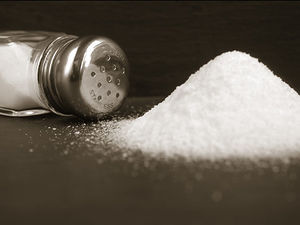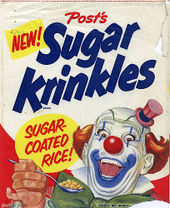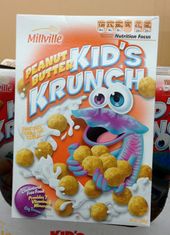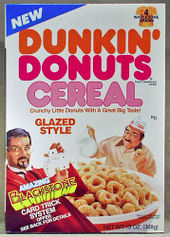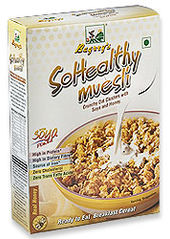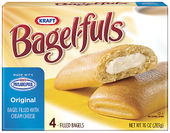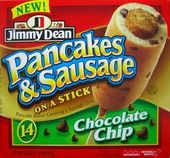User:Nikau/Processed food
People often say "you are what you eat".
So what exactly do pirates and astronauts eat that makes them so awesome?
Processed food.
When legs were wood, hands were hooks and merchant vessels were absolutely screwed, there was only one choice on the menu. Hard-tack, the hard-assed war-vet grandfather of modern processed foods. Little more than flour and salt, it was all the privateers needed to fuel an army of miscreants so effective the Vikings would blush. Forget your fresh fruit, your leafy green vegetation, even your cooked meats; that was the swill on the banquet tables of the gluttonous Spanish nobles who's galleons were broadsided, raided and turned into a fish bowl decoration.
With the benefits of science and innovation, a few centuries later we can liquefy, acidify and blast-ify that hard-tack into space as dinner for the few suited bastards that currently orbit the planet at 7.8 km/s.
So, if processed food is good enough for the best that has ever popped out from between the legs of a mother, why isn't it good enough for you?
History[edit | edit source]
Today you are always hearing about the pros and cons of renewable and non-renewable sources of energy and their impact on planet Earth. However in our opinion planet Earth can shut the hell up, because humans have only ever had exactly one source of energy — food — and the only pros and cons we dealt with for thousands of years was how fast the animal could run and how closely the vegetable resembled a dick.
The Aztecs, who literally ate the hearts of their enemies, didn't think that diet was quite bad-ass enough and often complemented it with a number convenience foods that required only water for preparation. The Conquistadors, who didn't really appreciate the Aztecs literally eating the hearts of their enemies, were still impressed by the powdered foods. The Conquistadors exchanged some hard-tack (and a little smallpox for seasoning) for a few examples of the "just add water" cuisine to impress the European Royal Courts, who had become bored with feasting upon a broad menu of meats that would later inspire Darwin's On the Origin of Species.
Unfortunately, plans for wide scale consumption of processed food had to be canned because, well, nothing could be canned yet. Only after a series of bloody wars did the British and Americans realize the value of feeding their troops steady, unspoiled rations, rather than expecting their men to be frenzied bone-smashing warriors while subsisting on a locally-sourced diet more associated with dazed bongo-bashing pacifists. In the 1810s, Bryan Donkin and John Hall in Britain and Robert Ayars in the United States started the canning companies that allowed their respective nations to dominate 19th century history with a frenzied bone-smashing boot, a belly full of unspoiled rations and a mild case of lead induced retardation.
The processed foods we know today were produced for the first time during WWII, as a means of prolonging supplies on the front, and also as a special treat for the heroic troops who were fed up of eating sauerkraut, blutwurst and lederhosen. Although the procedures were primitive by today's standards, rarely consisting of more than putting things in aluminium cans, they were an instant hit with the pawns. Young men were lining around the block to enlist for the dual honour of serving their country and tucking into a delicious ham-stick. It was a rite of passage. You're not a man until you've faced your enemy in battle, or at the very least eaten a hamburger-in-a-can. Many of those brave young lads are now enjoying the best tinned meats Heaven has to offer.
When the war ended, the food industry realised the financial potential of processed food. It had several advantages over "normal" food in that it was cheaper to make, cheaper to buy, lasted longer and tasted delicious. Products like creamed-crab and powdered-mayonnaise are still popular today, whereas others, such as fish-sticks and spray-cheese, weren't so successful and seem bizarre to modern consumers now.
Preservatives & additives[edit | edit source]
We see your amusing bowl of fruit and raise you food spoilage. Within a week you will need to call the cast of Aliens to battle whatever comes out of the bacterial colonies growing on your salad, and don't act surprised if your bowl of fruit starts trying to attach itself to your face if you leave it at the back of the fridge too long.
Yes, it appears every disease you hear about during a sex education class and their grandmother enjoys chowing down on fresh food, too. Humans didn't fight their way to the top of the food chain to be killed by a cucumber being piloted by some E.coli.
Sodium Chloride[edit | edit source]
Let me introduce two of the baddest motherfuckers on the periodic table, sodium and chloride. Kicking pathogens in the balls is just a good bonding activity for the pair of them, because the day nature starts allowing bacterial growth on foodstuffs is the day osmotic pressure starts kicking bacterial growth off foodstuffs.
The addition of salt to meat creates a solute-rich environment for microorganisms, which is kind of like saying you created a water-rich environment for your pet turtle when you flushed it down the toilet, except instead of potentially creating a zany team of reptiles, salt creates a pile of non-zany, dehydrated pathogen corpses. After winning the unthinkably-light weight champion of the world belt a billion times over, sodium chloride still has the heroic presence of mind to save the lipids in the meat from certain decomposition at the hands of a presumably goateed oxidation process.
Ancient people knew that the best preservative was gladiatorial combat at a molecular level. In fact, the word salary comes from the money given to Roman legions to buy salt, because it was totally expected that the soldiers would burn through a whole pay check salting the living hell out of anything that moved within a given radius. Rome was already throwing barrels of wine at the Hallstatt Celts faster than Donkey Kong in exchange for salted meats, so the whole salarium thing was basically just applying a second coat to a lump of meat that could pass as a salt shaker in its own right. We guess saving Rome from barbarian hordes probably took upon more importance when what you were eating could outlast the Empire.
Potassium Nitrate[edit | edit source]
So your knowledge of chemistry starts and ends at buying a season of Breaking Bad on DVD, not to worry. Type potassium nitrate into Google. You're now on a terrorist watch list, because it is totally saltpeter, otherwise known as the main ingredient in gunpowder. Processed meats are now preserved with so much of the stuff that you could probably take down Blackbeard with a decent stick of salami.
Maybe you think your stomach shouldn't be able to fire cannon balls, well how about a visit from our little friend botulism. Botulism lists its hobbies as being more toxic than a king cobra and a box jellyfish riding a tandem bicycle made of anthrax. Oh, that and basically being killed, given a funeral service and a heartfelt obituary in the local paper by nitrate additives. In other words, preservatives are the pump action shotgun in foods that prevent you dying in a manner that would make a zombie film call bullshit.
Cellulose[edit | edit source]
Vegetarianism usually gets the short end of the shortest stick in dwarf town, but that is mostly because no-one has told the public the dietary choice means you are still able to literally eat a whole goddamn forest. If meat is murder, then cellulose is property destruction on a grand scale, because cellulose is the scientific term for we chopped down a virgin forest and turned it into wood pulp.
Getting wood is the perfect thing for adding fibre to foods as varied as cheese and meat. We know neither of those things naturally feature fibre, a plant product, because they are too busy being totally full of fats. If every one of the promises, poorly written personal anecdotes and stock photos of doctors smiling nervously in spam emails about weight loss were blended into a single shake, that shake still wouldn't be as good as cellulose, an ingredient that can replace up to 50% of fats in some foods. If the food industry was given free reign, humanity could basically weigh half what it does now. Hell the before photos in the diet ads would be like supermodels crying they couldn't be made out of weapons grade sex.
And that isn't even the best thing cellulose does. You know how icecream tends to be creamy and not hard enough to sink Titanics, like regular ice? If you want to say thank-you, just hug a tree.
Packaging[edit | edit source]
Processing the food is only half the battle, the other half is actually getting the thing sold. This is psychological warfare on a scale that would make Goebbels chow down on another cyanide pill in fright.
While fresh foods couldn't care less if they went home with you for dinner or were dumped in a bin for worm feed, processed food does everything short of sexual favours for the consumer in the hope of a sale. They may not even stop there judging by the expressions of these mascots.
| |
| |
|
Cereals, with their massive chunk of the food pyramid, must be like the blockbuster film of the food because the mascots don't even bother to turn up for every other food group. Instead the prospective company just chucks their design team more photoshop than the cover of a women's magazine and tells them to get the food to look like it is moving.
| |
| |
|
